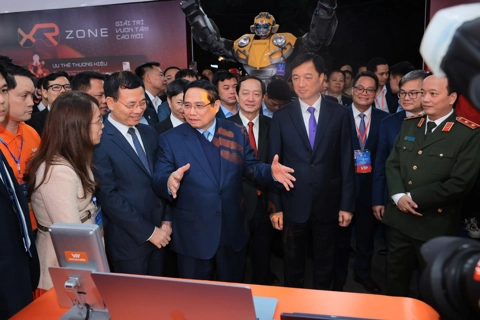Vietnam
Experts call for less state monopoly in network industries in Vietnam
Jul 07, 2018 / 06:14 PM
A reduction in state monopoly in network industries will give a boost to and turn the Vietnamese economy in a fully market-based one, according to experts.
Experts have gathered at a workshop in Hanoi, calling on the state to reduce monopoly in network industries in order to create a fairer playing field for economic sectors and increase efficiency of the local economy.
Participants suggested restructuring the economy in tandem with stepping up the reform of state-owned enterprises and narrowing the fields of state monopoly.
The power sector should ensure independence among manufacturing, transmission, distribution, and free price negotiations with customers; publicize their electricity price structure; and launch an independent supervisory agency for the sector.
Experts agreed that although the railway industry owns a lot of strengths and priorities, it is now the weakest sector in Vietnam's development chain.
Experts proposed continuing to restructure Vietnam Railway Corporation, attracting private investment in railway services, and establishing an independent supervisory body.
Regarding aviation, they called for ensuring airlines’ fair and equal access to airport infrastructure at reasonable costs, issuing a mechanism to manage airport management units, and reducing Airport Corporation of Vietnam’s monopoly over airports.
In the telecommunications sector, participants underscored the need to drastically privatize state-owned enterprises, especially Vietnam Post and Telecommunication Group and MobiFone Corporation, while building a system to safeguard against possible monopolies.
After 30 years of carrying out reforms, Vietnam is still talking about the transition to a market-based economy, said CIEM Director Nguyen Dinh Cung.
"I believe that the cliché "in transition" is just a way to justify weaknesses, delay implementation or deliberately refuse to implement reforms. In at most five years' time, we need to stop this practice of just talking, put an end to transitory period and decisively move to the full market economy," Cung stressed.
"We need to clarify definitions, A is A, B is B, if we cannot make them clear, we must change, otherwise these concepts will arise and restrain our weaknesses in the development process," the economist added.
The scientific event, hosted by the Central Institute for Economic Management (CIEM) and the Australia-Vietnam Economic Reform (Aus4Reform) Program on July 6, is part of the "Australia-Vietnam Economic Reform" program (Aus4Reform Program) funded by the Australian government to improve the business environment, particularly in network industries in Vietnam.
The program enables scientists, experts, managers, and policymakers as well as the business to present opinions on the field and suggest measures to continue the process of reform towards a healthy and fair business climate and improving Vietnam’s competitiveness, Cung said.
The Aus4Reform Program is expected to benefit at least 1 million private firms by 2020, contributing to increasing the number of female-led enterprises, while also facilitating Australian investment in Vietnam thanks to a more competitive and transparent business environment.

Seminar on reforming state monopoly in network industries held in Hanoi
|
The power sector should ensure independence among manufacturing, transmission, distribution, and free price negotiations with customers; publicize their electricity price structure; and launch an independent supervisory agency for the sector.
Experts agreed that although the railway industry owns a lot of strengths and priorities, it is now the weakest sector in Vietnam's development chain.
Experts proposed continuing to restructure Vietnam Railway Corporation, attracting private investment in railway services, and establishing an independent supervisory body.
Regarding aviation, they called for ensuring airlines’ fair and equal access to airport infrastructure at reasonable costs, issuing a mechanism to manage airport management units, and reducing Airport Corporation of Vietnam’s monopoly over airports.
In the telecommunications sector, participants underscored the need to drastically privatize state-owned enterprises, especially Vietnam Post and Telecommunication Group and MobiFone Corporation, while building a system to safeguard against possible monopolies.
After 30 years of carrying out reforms, Vietnam is still talking about the transition to a market-based economy, said CIEM Director Nguyen Dinh Cung.
"I believe that the cliché "in transition" is just a way to justify weaknesses, delay implementation or deliberately refuse to implement reforms. In at most five years' time, we need to stop this practice of just talking, put an end to transitory period and decisively move to the full market economy," Cung stressed.
"We need to clarify definitions, A is A, B is B, if we cannot make them clear, we must change, otherwise these concepts will arise and restrain our weaknesses in the development process," the economist added.
The scientific event, hosted by the Central Institute for Economic Management (CIEM) and the Australia-Vietnam Economic Reform (Aus4Reform) Program on July 6, is part of the "Australia-Vietnam Economic Reform" program (Aus4Reform Program) funded by the Australian government to improve the business environment, particularly in network industries in Vietnam.
The program enables scientists, experts, managers, and policymakers as well as the business to present opinions on the field and suggest measures to continue the process of reform towards a healthy and fair business climate and improving Vietnam’s competitiveness, Cung said.
The Aus4Reform Program is expected to benefit at least 1 million private firms by 2020, contributing to increasing the number of female-led enterprises, while also facilitating Australian investment in Vietnam thanks to a more competitive and transparent business environment.








